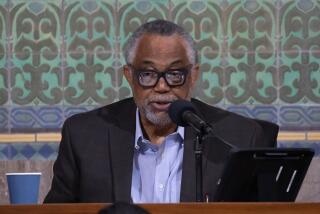Conroy’s Accuser Put on Defensive
- Share via
SACRAMENTO — An ousted legislative aide admitted Tuesday during the sexual harassment trial of former Assemblyman Mickey Conroy that her onetime bosses gave her a pay raise after she first voiced her grievances and accommodated a desire to shift her work schedule.
During laborious cross-examination by Conroy’s defense attorney, Robyn Boyd also said the kissing, hugging and touching stopped after she raised her concerns, but that the office environment remained troubling for her.
“With respect to most of the things directed at me, the touching and kissing, I had some good success” after complaining, Boyd said. “But with respect to what was going on around me, no.”
Boyd, 37, has sued Conroy, his former chief of staff Pete Conaty and the Assembly claiming that as a $6-an-hour part-time assistant, she was subjected to hugs, kisses, inappropriate touching and sexual jokes, then was ostracized and ultimately fired for complaining.
The former Republican assemblyman from Orange and his top staffer deny the charges.
Conroy left office in November because of term limits. He was trounced in a bid for a seat on the Orange County Board of Supervisors and his opponent repeatedly brought up the harassment case.
Dennis Murphy, Conroy’s defense attorney, spent hours questioning Boyd in detail to underscore a kinder, gentler side of Conroy and his office for the nine-man, three-woman jury.
Murphy pointed to notes Boyd kept during her tenure with Conroy in 1993 suggesting the office environment improved after she complained to her bosses. He also noted that Boyd was kept on the staff while several others had their hours reduced or were laid off.
Boyd acknowledged during questioning that she called Conaty for help when her daughter suffered a serious cut on the face in a playground accident. She said a doctor initially suggested the cut would require plastic surgery costing up to $5,000.
Conaty made the effort to retroactively get Boyd’s pay increased to $9 an hour and include benefits that could be used for her daughter’s medical care.
She was not fired until November 1993, three months after the pay raise. Conroy and Conaty say she was laid off because of budget cuts and poor job performance.
Boyd also said that a few months after complaining about sexual harassment, she asked Conaty if her hours could be shifted to mornings so she could be home when her children returned from school. The chief of staff went along with the change.
Boyd said that Conaty increasingly yelled at her during the fall of 1993, but admitted she wasn’t the only one to get such treatment.
“It was a real oppressive situation,” said Boyd, who argues that Conaty “didn’t always give crystal-clear instructions,” then would criticize the results.
Another former employee at Conroy’s office had a different take on the office environment.
Yolanda Benson, who worked for Conroy from 1991 until Boyd was hired in 1993, testified it was not rare for her to hug or kiss the boss on the cheek, but that she felt it was only a friendly gesture.
Conroy, Benson said, “was kind of like a grandpa.”
Benson said she volunteered on several occasions to rub Conroy’s neck when it hurt, but he never made a request. Moreover, Benson said, she kissed Conroy on the cheek on at least one occasion with his wife standing there because she did not feel it was sexual.
The former staffer also said she, like Boyd, would occasionally accompany Conroy to after-hours political functions, but that “it was strictly voluntary” and she never felt it inappropriate.
Murphy, meanwhile, zeroed in on other traumas in Boyd’s life, noting that during therapy sessions, she tended to complain mostly about stress at home with her marriage or children, not the job. Boyd, who is adopted, also suffered the trauma of having her birth mother threaten to sue after she attempted to reunite with the woman. That information was gleaned from notes of her therapy sessions obtained during discovery.
Asked if she repeatedly discussed with a friend the possibility of separating from her husband, Boyd said, “Those were fleeting thoughts that were in and out.” But she admitted the demands of family and a job made her feel like “the well had run dry emotionally.”
During questioning by her attorney, Boyd said that she felt Conroy “expected a kiss on the lips every time he came in” and that he would put his arm around her, draping it so his hand rested on her rib cage and the side of a breast.
Boyd said it made her irritable, depressed and unable to sleep.
More to Read
Sign up for Essential California
The most important California stories and recommendations in your inbox every morning.
You may occasionally receive promotional content from the Los Angeles Times.













